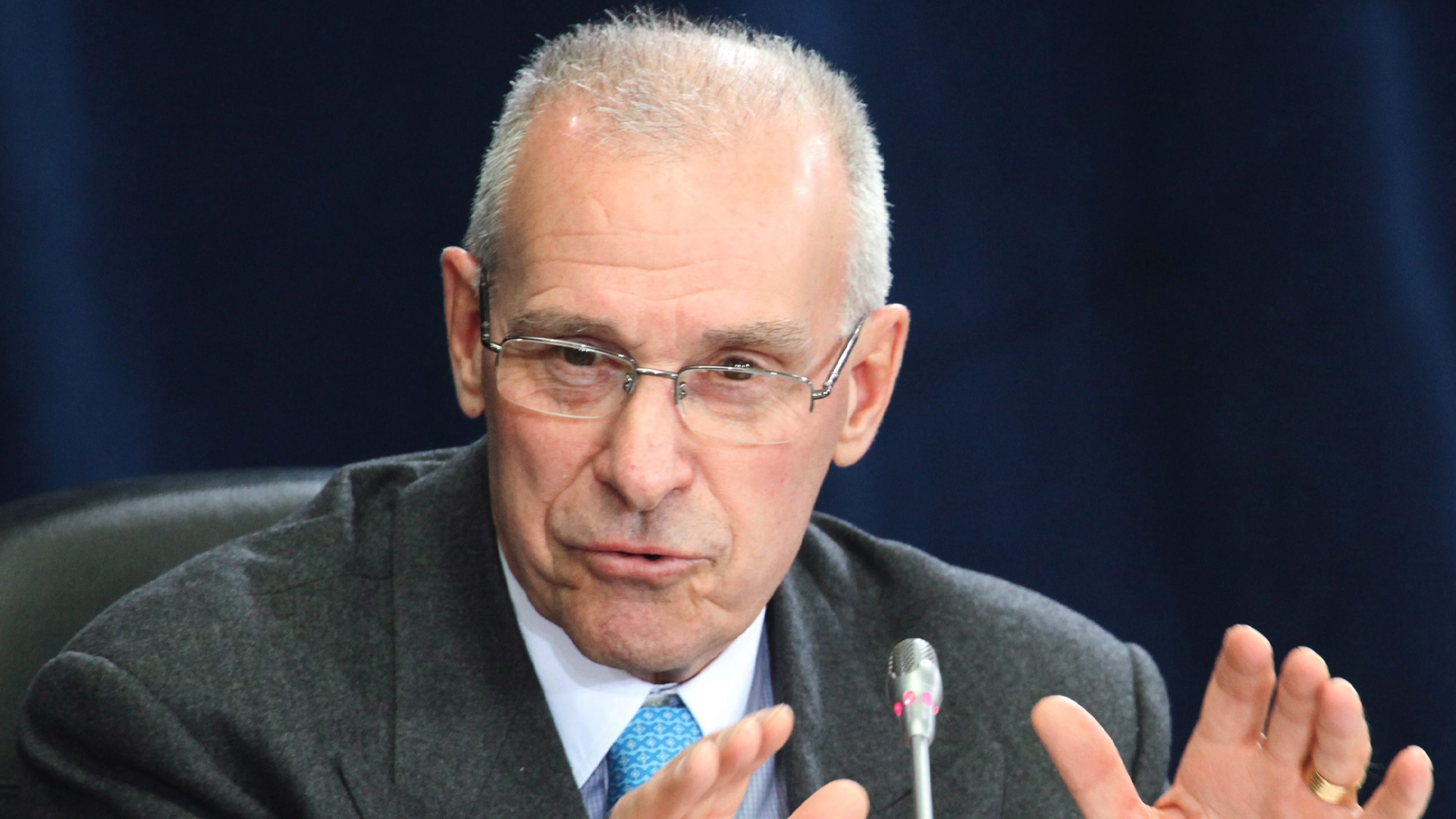
(Version française disponible ici.)
A lack of trust between politicians and senior levels of the public service, and a Prime Minister’s Office that calls all the shots, is “destroying” Canada’s public service, warns Paul Tellier, Canada’s former top bureaucrat and former head of both Canadian National Railway and Bombardier Inc.
“The current government, with centralization of everything in the PMO, is in the process of destroying the public service … and the word ‘destroying’ is not too strong,” the former clerk of the Privy Council in the Brian Mulroney era said in an interview.
Tellier made his comments after the release of a new report, Top of Mind, by two think tanks – the Ottawa-based Institute on Governance, and the Brian Mulroney Institute of Government at St. Francis Xavier University – which threw the spotlight on the increasingly troubled relationship after probing public service executives at all levels of government about their biggest challenges.
The report found that today’s executives worry about falling public trust in government; the decline in senior bureaucrats giving “fearless advice” to ministers; a hollowing-out of policy capacity; a post-pandemic economic reckoning; conflicts among levels of government; and the need for public service reform.
Speaking truth to power discouraged in public service
Talks stall as public service union seeks 13.5 per cent wage increase over three years
The relationship is a longstanding problem, one that Tellier argues was aggravated by the Stephen Harper rules-bound Federal Accountability Act. But he thinks the problems have worsened under the current Justin Trudeau government.
Tellier questions how the public service can recruit and keep top talent, as well as drive change if deputy ministers and ministers feel compelled to check everything they do with PMO.
“There is no way that if I was a cabinet minister, I would allow a bunch of people in PMO to tell me how to do my work. And it’s at every level, it’s not only for junior ministers, the most senior ministers… It’s for deputy ministers and departments.”
“So why, if you trust the minister and if you trust the advisors to the minister in his office and in the department, do you want six people in PMO to review a draft press release, or a tweet?”
Tellier has never been far from Canada’s public service over the past five decades. He joined as a young lawyer in the 1970s, went on to lead the public service and advise ministers and prime ministers. He has watched various public service renewal efforts come and go – including Public Service 2000 (PS 2000), which he led under Mulroney.
Mulroney came to power after the Liberals had ruled for all but a few months from 1963-84. At first, the new prime minister distrusted the public service and promised to issue them “pink slips and running shoes.” But Mulroney said in a recent interview he grew to trust and rely on public servants who gave him the “straight goods,” even poaching senior bureaucrats like Derek Burney and Mark Entwistle to join his PMO.
Mulroney also told the Institute on Governance that without the work of public servants, “we wouldn’t have got our major agenda through.”
Today, many experts say much about the public service needs fixing, but Tellier believes the first step is to restore trust between politicians and bureaucrats – a key relationship in Canada’s Westminster-style democracy.
“There’s no trust,” said Tellier. “And it starts at the top.”
“I don’t know what happened (to trust). I like to say, if you write a good policy paper or a good briefing note, it is going to be read. But if it’s not going to be read, why bother?
The relationship has been strained for years, but respect for the public service nosedived during the Harper era as its role was diminished, its advice devalued and its neutrality undermined.
The Federal Accountability Act, with its focus on rules, oversight and compliance, changed the role of the deputy ministers, which left them inward-looking and isolated from Canadians.
Tellier pulls no punches about the accountability act, introduced by the Harper government in response to the sponsorship scandal. He called it a “mistake” that must be reviewed.
He said the act deepened a culture of risk-aversion, putting a stop to public servants meeting with business leaders, which was essential to understanding the various forces at play when developing policy.
“The accountability act was a mistake – not every single clause – but I think that it went way too far. As a result, it has deprived future governments of very useful input from the public service and the business sector and visa-versa.”
The public service’s job is to offer policy advice, then deliver programs and services to Canadians. Of late, the focus on reforming the public service is aimed at fixing problems that get in the way of implementing programs and service – an archaic human resources regime, a gridlock of rules and outdated technology.
But Tellier argues such reforms miss a key problem – fixing the relationship between ministers and deputy ministers.
“I think that Tellier is right about that,” said Lori Turnbull, director of the school of public administration at Dalhousie University.
“There’s only so much the public service can do by way of self-improvement that will really change anything if the political classes aren’t interested in what they say or what ideas they have.”
Take innovation. If politicians aren’t interested in public servants’ advice or innovations – unless it’s risk-free – then there is no impetus for innovation, Turnbull said.
A big problem is politics. Parties get elected on campaign platforms they consider a “contract with the voter” that they must deliver. As a result, they come to power knowing what they want and don’t believe they need any advice from public servants.
This leaves little “time and space” for public servants, who end up “playing at the margins,” taking care of implementing promises, but not coming up with the big ideas, Turnbull said.
Also, ministers want advice and answers fast. They complain that public servants take too long to gather evidence and assess options. That urgency has ramped up over the years because of technological change, the 24-hour news cycle and the rise of social media.
“There’s always been a kind of time difference between how fast the political side wants things, and how quickly the public service can move while still doing its job responsibly,” said Turnbull. “That time crunch seems to be getting worse. At one point, it was a healthy tension and now it’s becoming unhealthy, where the political side stops waiting and just does it. “
But Turnbull worries what could happen to the already fractured relationship with the shift to a public service with more flexible working arrangements in the wake of COVID-19.
She said executives and politicians are more likely to return to the office “in real time” while the rest of the public service could work remotely from anywhere across the country. That could further distance senior bureaucrats and politicians from the rest of the public service, which delivers services and does the legwork for evidence-based policy advice.
Stephen Van Dine, senior vice-president of public governance at the Institute on Governance, said those “opportunities to have a quiet word” with the minister that are critical to building trust are less likely in a public service where some are working remotely.
“The hustle and bustle of briefing a minister, whether in the car to-and-from the Hill, over a sandwich, in a hallway where you can grab one-on-one encounters where the minister and deputy can have a quiet word,” Van Dine said. “If these opportunities become fewer and fewer, that is like the compounding impact of (playing) broken telephone.”
Social media is complicating the age-old neutrality of the public service
Canada is not alone in facing this issue. The tensions between ministers and senior bureaucrats have been studied to death over for years. A major U.K. study on the relationship called it the “fulcrum” of a Westminster system. When it’s not working, policy and service delivery are compromised.
But past efforts at fixing it in Canada have focused on making the public service more accountable – such as the accountability act – and responsive to what politicians want. There’s been little discussion of what ministers could do to repair the relationship.
Tellier said there must be a “healthy tension” between public servants and politicians, but that balance is out of whack with politicians increasingly dominating.
Without trust, frank discussions between politicians and public servants — which Tellier called “the tennis match” — don’t happen, putting policy and delivery at risk.
He said a fix begins with the prime minister, who must make it clear that ministers should consult their deputies. And if they don’t trust them, the prime minister should replace them with deputies they do trust.
This article was produced with support from the Accenture Fellowship on the Future of the Public Service. Read more of Kathryn’s work here.










